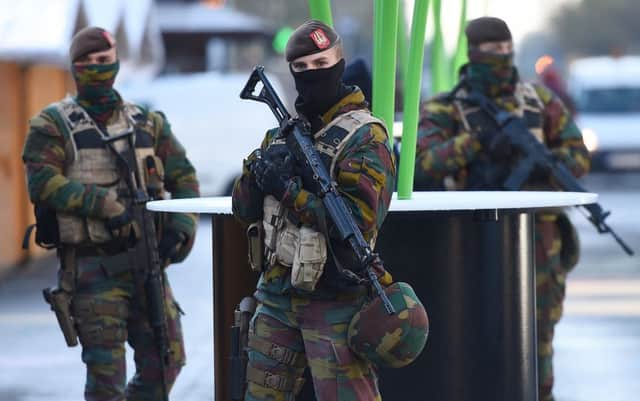Brussels lockdown: New terrorism suspect charged


Belgian officials said that the suspect, who was not identified, was charged with “participation in the activities of a terrorist group and a terrorist attack,” referring to the 13 November attacks in Paris. Three others were charged with similar offences last week.
It is believed the arrest did not relate to Paris suspect Salah Abdeslam, thought to have fled the scene after the attacks which killed 130 people, without detonating his suicide vest.
Advertisement
Hide AdAdvertisement
Hide AdBrussels last night faced a fourth day of lockdown as Prime Minister Charles Michel announced the level four terror alert would remain in place until 30 November.
Michel said the additional security measures, which have shut down public transport networks and closed educational institutions, would remain in place until Wednesday, when schools and Metro stations would open “gradually”.
Meanwhile, in Paris, an area was sealed off as police were believed to have found a suicide vest in a rubbish bin.
Some citizens of Brussels, which has been under lockdown since Saturday night amid fears of a “Paris-style” terrorist attack, yesterday described a “ghost town” with universities, schools and the Metro system closed, but for many residents, it was business as usual. Most supermarkets remained open, while most workplaces – including offices of the European Union – told employees to turn up. The raids that began on Sunday night continued yesterday as police searched five properties in the Brussels regions and two in Lieges, after arresting 16 people in overnight swoops – mainly in the district of Molenbeek. A further five people were arrested yesterday morning.
It was reported that a sum of €26,000 (£18,300) was seized during one of the searches.
Federal prosecutor Eric Van Der Sypt yesterday said no firearms or explosives were found in the raids.
Belgian Interior Minister Jan Jambon said that “investigations will continue until we’ve fixed this problem”.
He revealed that investigators believe Abdeslam “must have a lot of support on our territory”.
Advertisement
Hide AdAdvertisement
Hide AdHe added: “That’s why all these searches being conducted at the moment are important.”
Roads were said to be busier than usual as workers going to their offices took to their cars amid closures on the public transport network.
The Metro system remained shut, while buses were running, although some bus drivers are believed to have refused to work.
Nadine Rosa-Rossa, a teacher in the Molenbeek district where anti-terror police have focused their operations, was quoted as saying that she thought the measures were “excessive”.
“It’s like we are in a war,” she said. “It’s not a good thing for the children, for the teachers, for everybody. I know little kids who are very anxious. And what do we tell the children? There are bad boys in the city?”
Frank Foley, lecturer in war studies at King’s College London and a terrorism expert, said it was difficult to know if what Belgium was doing was justified because authorities have provided so few details about their decision.
He said the measures intended to avoid attacks similar to the ones that caused devastating carnage in Paris could even be counterproductive if they last too long.
“If these dramatic measures continue in Brussels, we will be doing the terrorists’ job for them,” he said. “The government may be unintentionally contributing to the atmosphere of fear.” Passengers planning to get on the Eurostar at Brussels yesterday needed their passports or ID cards to board, despite the Schengen agreement which usually means travellers can pass between member countries without any identification. The UK is not part of Schengen.
Advertisement
Hide AdAdvertisement
Hide AdEurostar said it would exchange tickets for – but not refund – passengers who did not want to travel to Brussels until Wednesday.
It said: “If travelling to Brussels any day up to and including Wednesday 25 November, we will be running a full service, however if you wish to exchange your tickets for another date and time you have 60 days to do this free of charge.”
Meanwhile, Rev Dr Andrew Gardner, Church of Scotland Minister in Brussels, admitted it had been a “difficult and sad” decision to cancel church services on Sunday.
“It made no sense to gather people together for Christian worship, when public gatherings were being discouraged, public transport disrupted and those coming into city were feeling anxious,” he said. “It was a strange Sunday.”
He added: “It is not just a small sector of the community that is affected – it’s all of us.”